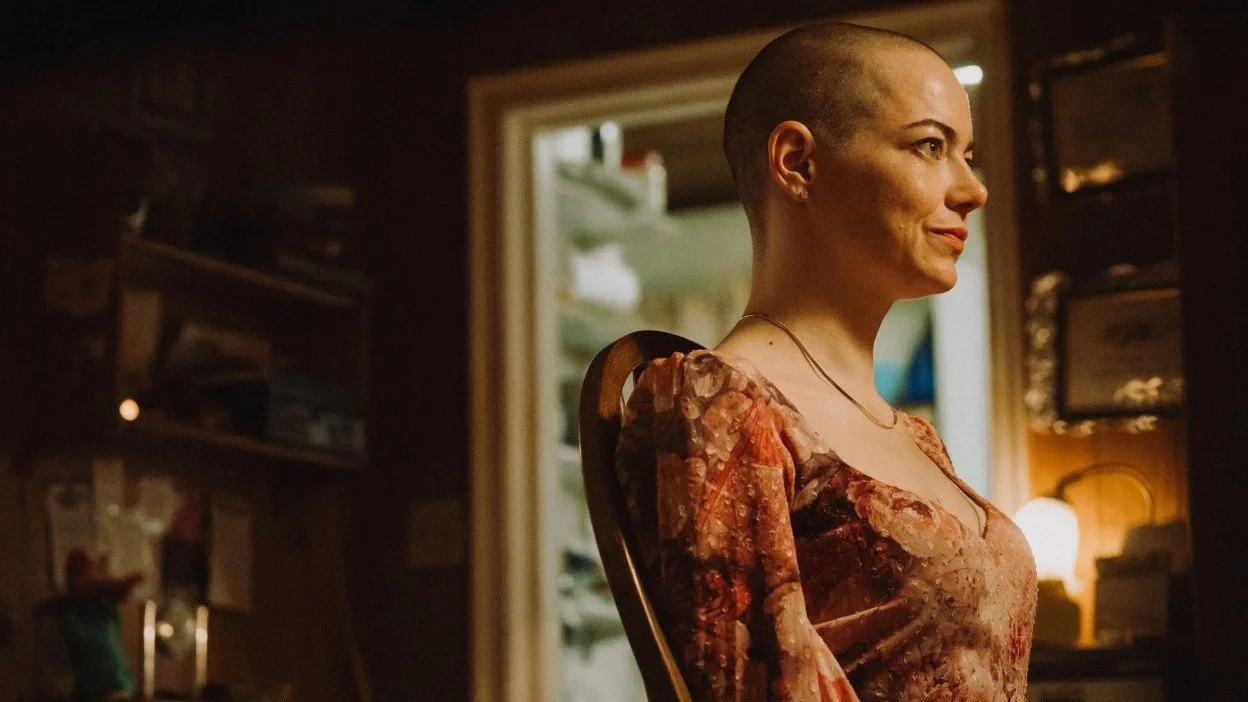Halloween Horror: Barbarian (2022)
“Don’t go into the basement.” You often hear this line in horror movies when a character looks into the shadowy basement to investigate a noise. Sometimes, you hear it from a member of the audience who’s pleading with the character on screen to do the rational thing and leave the creepy basement alone. Sometimes you say it to yourself when watching a horror movie. But it’s a futile phrase. The character will go into the basement. Creepy things will be down there. That inevitability is the entire reason we watch the movie. The promise of horror generates the tension, which we desperately want to relieve with a laugh or a scare. Zach Cregger’s new horror movie, Barbarian, mines this tension to scare us, make us laugh, and play with our expectations.
Barbarian follows Tess (Georgina Campbell), who shows up at an Airbnb in a bad Detroit neighbourhood. The lockbox is empty. There’s no key to get in. Luckily, someone is home, but it’s another guest, Keith (Bill Skarsgård), who is renting the Airbnb as well. The host mistakenly double-booked it. Tess is annoyed, but she decides she’ll get a hotel. Keith thinks that’s a bad idea. It’s a bad neighbourhood and she shouldn’t sit in her car at night, calling hotels that are filled up for a medical conference. She can sleep in the bedroom, he’ll sleep on the couch, and they’ll sort everything out with the host in the morning. She reluctantly agrees, just for the night. What could go wrong?
That’s the basic premise of Barbarian, but if you know anything about the movie, and about the buzz it generated online, you know that’s not really what the movie is about. So you go into Barbarian with the anticipation of what horrors can emerge from this basic, creepy, but pretty realistic scenario. Cregger knows you are expecting the other shoe to drop, expecting Keith to be a creep, expecting there to be someone else in the home, expecting there to be some sinister reason behind the mixup. He sets up the scenario to make the tension and anticipation plain. And then he and his team are adamant about frustrating that expectation and diverting into some bold, wild, bonkers avenues. He knows that Tess shouldn’t go into the basement, but knows that she will. And what she finds there will thrill us.
Barbarian is not the movie you expect it to be, but it also is. In a way, it functions like an elemental breakdown of horror in general. In horror, there’s an ordinary scenario that cannot be allowed to remain ordinary. You wait for the horror to break the ordinariness of the scenario, thus breaking the tension. You get scared and then you feel an emotional release. And then you do it all over again as the horror movie progresses, with each scene fulfilling a miniature version of the approach as a whole. At least, that’s the way it’s supposed to work. Some films go for the full-throttle approach, such as Adam Wingard’s Blair Witch or the original REC, never letting up once the tension builds. Others are more subtle, like The Shining, and worm their way into your subconscious. But they are all meant to tap into that primal part of your brain that mistakes fiction for reality and channels fear and anguish and relief while watching scary things happen on screen.
Often, when something scary happens on screen, we scream or feel a chill run up our back. Cregger plays with darkness and shadows and unknown environments to make this chill palpable. There are genuinely creepy, uncomfortable, horrifying images in Barbarian. Cregger is horror literate, so many of these images reference other, great horror films, which I won’t mention so as not to spoil where the film goes.
But other times, when something scary happens, we laugh. It’s natural. We’re uncomfortable and we react to that discomfort. Barbarian leans into the comedy at moments, knowing that comedy, like horror, is often born out of discomfort, tension, or surprise. There are jokes throughout the film, and sometimes not the kind of jokes you expect. There are topical ones about gender dynamics and male presumptions, but there are also grisly scenes that play up the inherent goofiness of watching something weird occur on screen. Cregger is a comedy actor with The Whitest Kids U’ Know, so he understands that on-screen comedy works off anticipation, expectation, and surprise. You set up the joke, expand on it, and then the punchline often shatters the assumptions of where we think the joke is going. Horror works similarly and Barbarian works in this particular way as well. It’s even structured like a classic three-part joke: set-up, detail, punchline. There are three distinct acts, and each one plays with and subverts what’s come before.
Much of the fun of Barbarian is not knowing where it’s going, even though you know it’s going somewhere, like the steps down the stairs into the shadows of an unknown basement. What horrors lie in wait. As is usually the case, the eventual reality cannot quite live up to what we cook up in our imaginations—but damn if Cregger doesn’t try to zig when we expect him to zag. On a purely narrative level, it’s hard to match the film’s strangeness.
The payoff isn’t as satisfying when you start to think about its themes and the forced topicality of aspects of the narrative. But for every politically-loaded moment in the second act, there’s a bold, disquieting formal choice, such as the use of wide-angle lens in a flashback that distorts the visuals to match the warped reality of the character we’re following.
All told, Barbarian is memorable and original, which is notable in a cinematic landscape that thrives off sameness and branding and predictability. Although to be fair, Barbarian weaponizes that sameness to its purposes. It desperately wants to surprise viewers who think they cannot be surprised. Top marks for trying.
7 out of 10
Barbarian (2022, USA)
Written and directed by Zach Cregger; starring Georgina Campbell, Bill Skarsgård, Justin Long, Richard Brake.



This amiable documentary about an underground art project is a subtly profound meditation on the value of art.